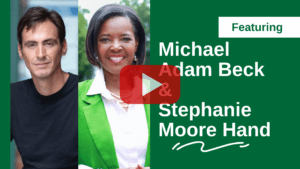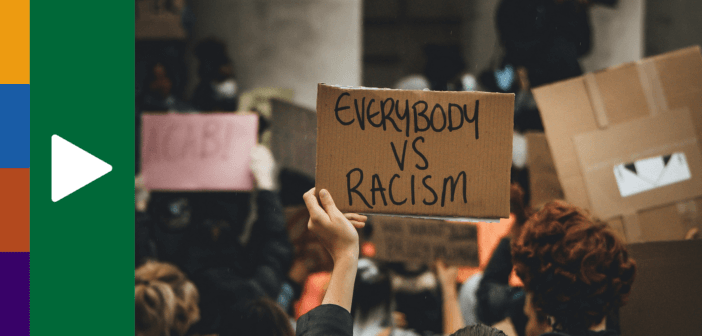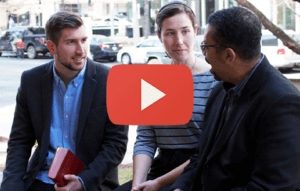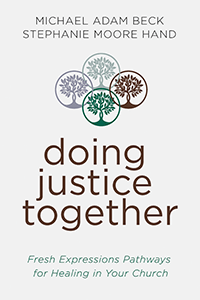
How can a faith community organize itself to combat the sin of racism? Michael Adam Beck and Stephanie Moore Hand share with us a practical framework for doing justice together that reimagines discipleship, leadership, and evangelism as tools for change.
Listen on Apple Podcasts | YouTube Music | Spotify
Watch on YouTube

Read in-depth interview
- Transcript — Click or Tap to Read
-
Announcer: Leading Ideas Talks is brought to you by the Lewis Center for Leadership of Wesley Theological Seminary in Washington, DC. Subscribe free to our weekly e-newsletter, Leading Ideas, at churchleadership.com/leadingideas.
Leading Ideas Talks is also brought to you by the free video-based study Moving Faith Communities to Fruitful Conversations about Race. This dialogue about race in America may be used to help your church bring people together to talk about moving forward bravely and boldly in the name of Christ. The study is divided into four 15-minute videos which may be used in one or more sessions. Watch now at churchleadership.com/videos.
How can a faith community organize itself to combat the sin of racism? Michael Adam Beck and Stephanie Moore Hand share with us a practical framework for doing justice together that reimagines discipleship, leadership, and evangelism as tools for change.
Ann Michel: Welcome to Leading Ideas Talks. My name is Ann Michel and I’m a senior consultant with the Lewis Center for Church Leadership of Wesley Theological Seminary. I also serve as one of the editors of our Leading Ideas e-newsletter, and I’m honored to be serving as the host for this episode of Leading Ideas Talks. My guests today are Michael Adam Beck, who directs Fresh Expressions Initiatives for Discipleship Ministries, and Stephanie Moore Hand, who serves as a vitality strategist in the Western North Carolina Conference of the United Methodist Church. They are co-authors of a new book Doing Justice Together, which describes a process for how churches can organize themselves, or perhaps it would be better to say, to orient themselves, to combat the sin of racism. So, welcome to you, Michael and Stephanie. Welcome to Leading Ideas Talks.
Stephanie Moore Hand: Thank you.
Michael Adam Beck: Yeah, grateful to be with you. Thanks for having us.
Ann Michel: So, I think particularly since the George Floyd murder, there’s been renewed interest at least among certain churches in addressing racism. But I think in many of these churches, racial justice is seen as just one of a menu of different social issues and the approach is often just to delegate the issue of racial justice to a racial justice team or a committee or something like that. Your book is suggesting a much more comprehensive and holistic approach to activating a church against racism. But before we get into the specifics of that model, I wanted to ask each of you about the experiences that led to you write this book and led to the articulation of the particular model that you described. So let me start first with Stephanie.
Stephanie Moore Hand: Thank you for the opportunity to be here with you today as I am an alum of Wesley Theological Seminary’s doctoral program, I’m going to say it started, the seeds were planted, deeper, deep roots there, in that type of work. But it started way back in my incident as a student athlete in Morehead City, North Carolina, where for the first time in my life I experienced injustice on a basketball court. A group of adults, not a child, but a group of adults, in a rural county began calling me out by name, calling me “monkey,” calling me the “N-word” in a basketball game. Not only did they do that, at the conclusion of the game they followed my team and myself and my coaches out to the bus and began rocking the bus back and forth, throwing rocks at the bus, calling and wanting me to get dragged off the bus. But we were able to get out safely. As a 17-year-old youth I experienced that. I’ve never talked about that since then until writing this book. Because the trauma of that was suppressed in my subconscious. But in writing this book, with all the incidents and things in America that have happened leading up to it, and as an ordained minister in the United Methodist church, I began to ask, “What do I do? How can I be a part of the solutions?” Of course, theological seminary teaches us that racism is sin. Anything that’s ungentle to the gospel of Jesus Christ falls in the bucket of sin. We don’t care how you cut it and what area it is in. Sin is sin.
So, there was a seed that planted in my spirit when the Florida Conference invited me to come to be a consultant in the hard work they were doing in the Florida Conference. Through that journey, not only did I see what can happen when leaders acknowledge the sin and are willing to heal from the sin, but that’s also how I met my friend Michael Adam Beck in that journey of going down and even in our annual conference in the work that we’re doing with Fresh Expressions. At the altar, at the conclusion of our cohort, I was in a prayer line, which was not his prayer line. But this is when I believe in the power of the Holy Spirit intersecting people’s lives. The person who was directing the lines, pushed me over into his line and we had a Holy Ghost, Holy Spirit encounter at the altar as he prayed over me. It was from that encounter that he circled back to me and said, “Hey, let’s consider writing a book together.”
Ann Michel: Michael, is that also the origin of this for you? Or have you had prior experience in working with congregations on the issue of racism?
Michael Adam Beck: My journey includes my own ongoing sanctification as a white male: awareness and repentance for my participation in the racist culture and systems and thoughts that are part of our society. But where it really became prominent for me, I grew up in a not-normal situation. I was born addicted. I was in and out of juvenile detention and experienced poverty as a kid of the 1980s crack epidemic. But the deepest place where I’ve seen racism in my life is in the church. And so, I was sent to Wildwood, Florida to pastor a congregation. If you’ve read anything from Isabel Wilkerson, The Warmth of Other Suns, she mentions Wildwood. So, this is a sundown town with a long legacy of racism and segregation. The congregation, which is a Methodist Episcopal South origin congregation, very much had its roots in that soil and was not neutral in creating a very dangerous and deadly situation.
So, coming into that and visiting with these very chronologically mature saints of the church and hearing them, at the same as they’re telling me their faith journey with Jesus, dropping the “N-word.” We started doing some Fresh Expressions in the MLK in that community, and really trying to heal that racial divide–doing some marches and some racial justice-oriented things. We had a Black church plant, God’s Glory Ministries, come and live with us. We decided not to have a financial arrangement, but really to kind of partner as kingdom partners and just live together and do ministry together. We started Fresh Expressions together. I had people in that congregation, long-term church members, call my biracial granddaughters “half-breeds” and use scripture to say we shouldn’t be “mixing the species” and things like that. That took a different level of intensity for me to think about my own grandchildren, my own children, their experience, and all of this. I just started to get really passionate about that work. We brought Stephanie to Florida to help us evaluate this and guide us on how we could go about the work of anti-racism as congregations and as a conference. We got connected in that and then the “Spirit moment” kind of brought us together to write the book together.
Ann Michel: Thank you for providing that background. So, your book offers a practical framework for addressing racialization. It’s a four-part pathway to form beloved community, to do justice together, as the title of your book suggests. I think it points really to a totally different way of being church, if I’m reading it correctly, it’s a way that reimagines some of the standard aspects of church life like discipleship, leadership, evangelism, and social action; and really reinterprets those. So, I’m going to ask you to address in turn each of the four components of your model. Let me turn to you first, Michael. The first of the four pathways is anti-racist discipleship. I think it really conceives of discipleship in a much larger, more multidimensional way than we’re used to thinking about discipleship. So, I wondered if you could describe the discipleship component of your model?
Michael Adam Beck: Sure. As I just described in that story, that’s a failure of discipleship, right? When people can go to church their whole life and be very involved, be in key leadership positions, and never have to deal with and confront their own racism. You know, something’s happened there.
But one of the things we play with in the book is the mission statement of the United Methodist Church, which is “to make disciples of Jesus Christ for the transformation of the world.” Beautiful mission statement, right? Two main components. If we form people to live and have the compassion of Jesus in their daily life, we’ll have a transfigured, better, changed world that’s more loving. But the crazy thing about the mission statement is it traces back to Matthew 28:18-20, The Great Commission. But we’ve made a “great omission” of what Jesus actually said. It’s the word “Go.” So, if you take the “go” off, all the arrows point to us. Come to our building. Come to our church. Come to our programs on our time, in a way that we’ve decided, in a language that we’ve chosen, with music we’ve decided before you get there.
Jesus’s whole thing was never about being a host, and the disciples building a building and saying, “Hey, come to us.” It was all about go out. Find the person of peace. Go out two by two. It was about being a guest and finding those organic relationships and doing life with people outside that we were sent to, right? So, we’re trying to recover some of that. But also, in doing that, how are we forming people to see their ongoing sanctification journey as healing from racism? [How are we] confronting those racist ideas and things that we participated in with the scriptures? We call Jesus the anti-racist Messiah. He has some anti-racist parables like the Good Samaritan, for instance. Helping people see that in scripture, while race is not a biblical concept in itself, the tribes and the ethnicity and the diversity but God bringing all those things together, like Stephanie talks about so powerfully, being the answer to Jesus’s prayer and becoming the new creation here and now. So, those are some features of it. But it’s focusing discipleship not just as this internal thing—we come to a Bible study—but to live it out in the world.
Ann Michel: I love the idea that discipleship involves going. I thought that was really powerful. But then there’s also a piece of it, if I’m hearing you correctly and reading your book correctly, that’s about learning and formation or reformation and transformation. How does that connect with the “go” part of it?
Michael Adam Beck: I’ll take it and Stephanie, you jump in. Part of that can require an unlearning process, unlearning stereotypes, and assumptions, and then building relationships with people where we do life. So, I would not want to deploy people who have not done that internal work. One of the things that we focus on in the book is that the diversity of God is all around our churches, usually just outside our walls. It’s usually not reflected, you know, as Dr. King said, “The church hour is still the most segregated hour.” It’s usually not reflected in our congregation. So how do we prepare people for the diversity that’s actually in the world? How can we join into that and be an incarnational presence in our communities?
Stephanie Moore Hand: I would simply add, as former Bishop Dr. Peter Story in South Africa said to me in one of my journeys to South Africa, “Until the church is working with the poor outside the walls of the church, the church is doomed to hell.” I said, “Well, unpack that a little bit.” He said, “The church isn’t waiting. God’s church isn’t waiting when it’s on the inside of the walls, when they’re doing Bible study, having worship, having administrative counsel, formulating missional projects and things. The church doesn’t truly become God’s church until they go on the outside of the walls and encounter the mosaic of all of God’s people.” But they can’t do that until they actually study scripture, worship together, true worship, and wrestle on the inside of the walls of the church so that they can be equipped to go outside of the walls of the church and meet people that they would never imagine encountering. But through the power of the Holy Spirit, through that type of leadership, transformation can happen.
Learn to Talk Honestly and Openly about Faith and Race Race with this Free Video-based Study
Moving Faith Communities to Fruitful Conversations about Race is a dialogue about race in America and may be used to help your church bring people together to talk about moving forward bravely and boldly in the name of Christ. The study is divided into four 15-minute videos which may be used in one or more sessions. Watch now at churchleadership.com/videos.
Ann Michel: Thank you. So, the second component of your model is shared leadership, which is actually something that I’m really passionate about myself. I’m a lay person. I’ve been in professional ministry for 30 years. And I’m all about trying to think about more inclusive models of leadership. But I wanted to ask, what does this look like in practice? Specifically in relation to your work of doing justice together? Why is it so important? Stephanie, could you address that?
Stephanie Moore Hand: Absolutely. I came from the AME Zion tradition. And while I was AME Zion, I had no idea of a sinful nature and the connectivity to the Methodist church, number one. But as I went to seminary and even my doctoral work at Wesley, my doctoral work is centered around multicultural, multi-ethnic America and how does that intersect with the church? Understanding that multicultural, multi-ethnic faith communities now, if we did the examination, the DNA of these, the majority of them are headed by Anglo men, number one. And number two, the construct of that is merging a black church, brown church, to a majority white church, but all the leadership on the stage is Anglo. Well, that’s not a great model of being the church. That’s really just growing your church. You just have a multifaceted people and that’s not shared leadership.
If you examine the United Methodist Church, which is about 89% Anglo, and you examine its leadership, you can conclude that it’s not really, in all spaces and places, shared leadership. The majority is on the Anglo tilt. Shared leadership is to make room around the table, not for people, because people can say, “Well, they’re not qualified to do it.” Well, I beg to differ. Mediocrity is all around us. So, shared leadership is ensuring that there are co-pastors leading multicultural churches. So it’s a woman who might be brown, and a man who might be black or white or whatever. So, what you see on stage, what you see in the upper echelons of the United Methodist Church, if it does not mirror what our society looks like in America, then we have much work to do. That’s not shared leadership.
That is probably one of the most challenging things to actually break the code for. But it’s doable because of the work that we did in Florida conference, the work that I believe some other annual conferences are being very intentional about. My friend, that’s going to change the trajectory of the church and make the church even more relevant in society. When in those upper echelons, we’re willing to give up a seat. Or [we’re willing to] simply make that table longer and add seats to it.
Ann Michel: So, the next component of your four-part model is labeled “justice-oriented expressions.” At the risk of oversimplifying that, I think it has to do with reconnecting the outward movements of the church—evangelism and church planting—with social justice. So, I want to ask you, Michael, the same question that I asked Stephanie. What does that look like in practice, and why is it important?
Michael Adam Beck: Here we drew a lot of wisdom from our friends in Latin America in a movement called the Base Ecclesial Communities. Leonardo Boff is one of the key theological writers about this. He wrote a book called Ecclesiogenesis. In that context, due to a clergy shortage, expressions of church form under lay leadership in every kind of nook and cranny of life. Intrinsic to the life of those communities is a movement towards creating justice and wholeness, particularly around poverty and systemic issues of the wealth gap and all those things.
We see a deep resonance with that and what we call Fresh Expressions. It came out of the UK originally, but it’s a global movement now. Where we locate that is when Jesus goes into the synagogue in Nazareth in Luke 4, and he says “The spirit of the Lord is upon me…” He reads Isaiah’s social justice litany. He says, “He has anointed me to proclaim good news to the poor and release the captives.” Then, Jesus goes about doing those things. Healing the sick. Liberating the oppressed. Proclaiming good news. As he does that, a community of disciples springs up around him that we call the church. So, one of the gifts of liberation theology is to start there. You do that and Christian community springs up from that activity.
So, in the Fresh Expressions movement, we have this process that we follow: loving, listening, loving and serving, building relationship, exploring discipleship out in the world in those relationships. So, what that looks like practically, is when we have these two churches coming together and we started this Fresh Expression together in the MLK called “Connect” where we do a breakfast church, and sharing leadership in that, and creating a community together that’s out in the world; we found a lot of tension happening. We were trying to bring the congregations together and worship together, but there were cultural differences and those things.
So, we started what’s called an Open Table Fresh Expression, or a dinner church together. Rather than people being oriented to the front and hearing a sermon and music, we sat around tables together. We did Jesus stories and sermonic conversation, and we asked questions where people had to really get to know each other. So that created this situation where we had to deal with our “isms,” right? We had to work with those stereotypes that we may have had of people. So, we had a very diverse group sitting around tables together and doing that work, and over time, through that, the congregation itself was transformed. Real depth of relationships started to form and we started to heal from a decades-long legacy of racism and segregation in that community. So that would be like a practical, justice-oriented expression—that intrinsic to its motivation is to create, to join the diversity of God that’s already in the community, and to build relationships around that.
Ann Michel: So, the fourth part of this model is labeled “reorganizing structures.” Again, at the risk of oversimplification, I think it’s about becoming a change agent to combat structures that perpetuate racism, both in the church and in society. You write that, “Our primary political identity is as Christian.” But not in the way that often is in the headlines. You advocate getting political in a different way than we’re used to thinking about that. What does it mean to become an effective change agent against racism today, Stephanie?
Stephanie Moore Hand: So, I think we already have the model. The question is, do we live into it? Revelation 7:9 reminds us that there will be a day when every tongue, tribe, nation, and people will be worshiping together. They will be. Not maybe. They will be. Then if you go to the Lord’s Prayer, “on earth as it is in heaven.” That’s the framework.
The question becomes, do we have the courage to actually go into those spaces and places where people don’t look like us, don’t have our social economics, don’t smell like us, and the list goes on and on. But we are already equipped. The word has already been passed. The question is, will the church rise up to do it? Just like when the George Floyd incident happened. I’m minimizing it, but I’m not minimizing it. It was horrific. But these things have been going on for over 400 years. So, I’m just going to throw that out there. So, churches in my district, formulated this group called Pass the Peace. Now I want to say, sometimes as church people we think we have all the answers. We have a framework. But our job is to go into community to do the excavating of what the greatest needs are, to build relationships, and to build trust. Then you can bring people together to have conversation around the greatest concerns in our community. So, we formed this organization called Pass the Peace, where we had a partnership with the Charlotte Mecklenburg Police Department. We were intentional in going to black, brown, and white faith communities, not just Methodist, but a multiplicity of folk. We said, “Hey, we need to at least begin having conversations.” We’re not talking about solutions. We’re going to simply talk to each other so that we can begin this trust walk, one to another, over food, because Jesus always had food in tense situations. He loved a fish fry. So, we would have conversation over food during the day.
This thing grew. We intentionally had youth, we had young adults, we had seasoned adults. All arrayed around a table to begin these conversations. It takes that type of intentional work to get to the root of the problem. To uproot the sinful nature of our society so that we can truly live in now—not tomorrow—but now as people worshiping together, praising God together so that we have a better, stronger world, a stronger society. Because at the end of the day, this ain’t our home. We’re all trying to get to eternity. So we have to do the work now so that we can see a different world. The church, not the government, not the business leaders, but those of us who say we profess Jesus Christ through the power of the Holy Spirit, we are truly the change agents because we have the changer inside of us.
Ann Michel: Thank you for sharing that testimony. Again, the book is Doing Justice Together: Fresh Expressions Pathways for Healing Your Church. As we prepare to wrap up, I understand there are some other resources available that congregations can draw on. I wanted to give you a chance to mention some of those.
Michael Adam Beck: Yes. There’s an e-book companion that comes along with the book. The book itself was trying to be simple, to come back to your question of what to do in a traditional congregation. There are sermon series, book studies that can help the congregation have hard conversations and get exposure to these ideas starting in that discipleship space, right? Then, wrestling with these ideas. There’s a whole video series on Amplify Media, with videos of people giving testimony about how they’ve experienced racism and healing racialization through the pathway. Then Stephanie and I, if a congregation’s ready for this, or your district, your conference, and you need a guide to help you along, that is work that we very much feel called to. We’d love to come and walk alongside you in that through coaching and cohorts. What would you add, Steph?
Stephanie Moore Hand: I would say that the book is not enough. It’s a beginning. But if you’re going to do the hard work, (we’re not accusing anybody of anything), but we know the church is the hope of the world and we have to continuously do the hard work to examine ourselves to ask are we going deeper in our faith? Like the old song says, “The wheel goes higher and higher.” Are we going higher and higher in Christ? Are we maturing in our faith? That takes a journey. So, we’ve put resources together to actually journey with annual conferences and districts so that people can rediscover God and grow deeper in their faith so that they can be transformative agents in our world for the sake of Jesus Christ.
Ann Michel: I want to thank both of you for your work and for your witness in this area, and also for your enthusiasm your helpfulness in thinking about how the church really can make a difference in this area. So, thank you so much for such a wonderful and inspiring conversation today.
Michael Adam Beck: Thank you for the opportunity.
Stephanie Moore Hand: Yeah. Thank you so much.
Don’t forget to subscribe to our free weekly e-newsletter, Leading Ideas, to be notified when new episodes are published. Visit churchleadership.com/leadingideas.
Doing Justice Together: Fresh Expressions Pathways for Healing in Your Church by Michael Adam Beck and Stephanie Moore Hand (Abingdon Press, 2024). The book is available at Abingdon Press, Cokesbury, and Amazon.
The Doing Justice Together: Background and Context e-book designed to support and document the ideas and practices found in the main book is available as a free, downloadable PDF.
Related Resources
- 10 Ways to Make Your Church More Inclusive by Brandan Robertson
- What Would Martin Luther King Jr. Say to the Church Today? by Anthony Hunt
- Honest Talk about Race and Racism featuring Michael R. Fisher Jr. — Leading Ideas Talks podcast episode | Podcast transcript
Photo by Arthur Edelmans on Unsplash






